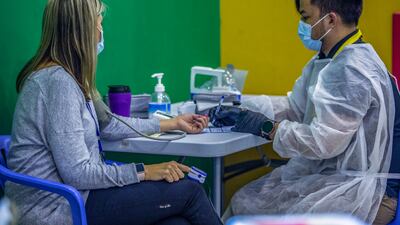People who have had Covid-19 are more likely to develop diabetes, hypertension or spend time in hospital following their recovery, a study by a health insurer found.
Patients were more likely to seek care for the two chronic diseases in the year following the infection.
The risk of hospital time for any reason also increased by 10 per cent to 20 per cent, said South Africa's Discovery Health, which has about 3.7 million members.
“We don’t observe any increased mortality risk for the recovered population,” said Shirley Collie, Discovery’s chief health analytics actuary. “That’s very comforting.
“The other things we are observing in the data is this increased risk of registering for diabetes, and getting a diabetes diagnosis, as well as a hypertension diagnosis.
“So that is quite marked in terms of the increased risk,” she said.
Thousands face further health problems
The 7,000 members who had suffered a Covid-19 infection were found to have a 1.38-fold higher risk of developing diabetes within two to 12 months of their recovery and a 1.11-fold higher risk of developing hypertension.
They were also found to have a 2.8-fold higher hospital admission risk in the first month after recovering from an acute Covid-19 infection and a 1.5 times higher risk two to 12 months after recovery.
Almost a third of those who had the virus experienced headaches, 14 per cent had problems sleeping and shortness of breath; 12 per cent suffered dizziness, 11 per cent a lack of concentration and 10 per cent experienced muscle and joint pain.
Almost half, 43 per cent, reported difficulties in performing activities required for daily living, the insurer said.
“If you had a vaccine prior to your Covid-19 infection, we don’t see this long-term trend,” she said.
“Then, for people who were unvaccinated at the time of infection and subsequently get vaccinated, we note almost a reversion to the population rate.”
The study has not yet been peer reviewed.
Tough road to recovery for Covid-19 patients
Numerous recent studies have linked continuing health issues to a recent coronavirus infection.
Research by the US Centres for Disease Control and Prevention found one in five people who catch the coronavirus are likely to go on to develop another health condition.
The study found those who contracted the virus were twice as likely to develop a pulmonary embolism or respiratory illness compared to people who were never infected.
Another CDC study also found children who recover from Covid-19 appear to suffer a significantly higher risk of developing Type 1 or Type 2 diabetes.
In data set, researchers identified a 2.6-fold increase in new diabetes cases among those who had the virus. In another there was a 30 per cent increase.
How does Covid-19 increase diabetes risk?
Experts do not definitively know how the virus can cause diabetes but they have theories.
It could be that the inflammation caused by Covid-19 could create insulin resistance, a feature of Type 2 diabetes.
“Another theory suggests that when coronavirus infects the pancreas it could trigger the immune system to attack and destroy beta cells, a key feature of type 1 diabetes,” says an information page about the association on diabetes.org.uk.
“Small studies looking at pancreas cells grown in the lab and pancreas samples taken from people who sadly died from coronavirus have suggested that the virus can enter and infect insulin-producing beta cells in the pancreas, causing them to die or change how they work. This means people can’t produce enough insulin,” it said.





















